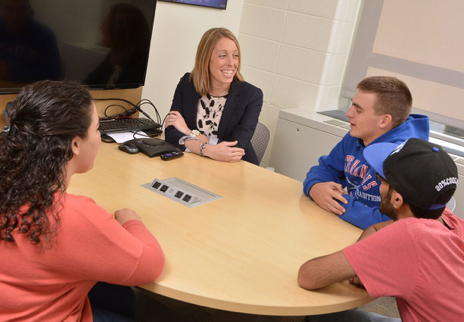Blog Entries
Once You’ve Found Your Shtick: An Overview of The Application Process
So–you’ve figured out what makes you you, that “shtick” that makes you stand out. Now you're ready for the next step in either your grad school journey or career/internship search!
When I hit this phase in my journey, I became suddenly overwhelmed. My schtick was helping others achieve their dreams through a holistic healthcare style. I was looking to apply to multiple schools for Occupational Therapy, each requiring unique documents. For many of these requirements, I was unsure how to go about representing myself and my shtick.
If you are asking, “What’s a shtick?”, go ahead and read “The Key to Getting Picked: Find Your Shtick” by Genevieve O’Connor where she not only explains this concept but guides you towards finding yours.
But, regardless of where you are in this process, there are a few bits of knowledge I found that can help your application be outstanding. Just as in your undergraduate college or a career search, you want the admissions team and employer to see who you are. You want them to set it apart from the rest of the applications. You want to be accepted!
What are the key components of your application, and how should you prepare them?
1. Resume (or CV)
Your resume displays a broad view of what you have done and what you are accomplishing. This gives admission teams (and employers) a brief idea of who you are. So, you want to ensure it's succinct! Revise your resume to communicate professionally with contact information, regular font and size, strong bullet points, and specialization to your application. Leading up to application time, think about how you can fill the gaps in your resume. Maybe some leadership experiences, an internship opportunity, or some jobs you’ve had! Continue obtaining these and placing them on your resume with crucial information about what you did to display your skills. By having a range of activities, you will also learn more about your own shtick. Check out the Career Planning Guide or set-up a meeting with the Career Development Center (CDC) to elevate your resume to the next level.
2. Personal Statements for Grad School
This document is much more specific than your resume but just as important. It needs to be tailored to the program (if possible) and to you! Do your research on the school you desire to attend, consider including keywords such as their mission and their values. You will want to write much about yourself: why you want this grad school opportunity, what event(s) have formed you, what makes you the right candidate…YOUR SHTICK! Have many people read and edit your personal statement to ensure that it is clear and outstanding. Again, you can read the Career Planning Guide or schedule a meeting with the Career Team Staff to start or better your statement.
3. Letters of Recommendations
Your resume and personal statements are great testaments to what you have accomplished and what you have been through. Letters of recommendation offer an outside look into you. Because of this, they can be used by admissions teams and employers to have a more holistic view. Use this to your advantage! Ask for letters of recommendation from those people who know you best (i.e. professors, current or past supervisors, religious leaders, or non-profit organizers). Note, this is not the place to have your mom write you a letter of recommendation. Admissions teams and employers want to hear from professionals who have worked with you and know your work. These recommenders should speak to your character, your work ethic, your leadership style, your integrity and so much more. Feel free to communicate with your recommenders the things you are hoping to emphasize in your applications, and what aspects that you would most like them to speak to. If your recommenders have your shtick in mind, they can help make your application holistic and complete. It's important to ask for these letters early (at least a couple weeks), as it will give the recommender adequate time to create a letter specific to you. And don’t forget to send each recommender a thank-you note!
4. Interviews
Many Grad Schools and most jobs require at least one interview. It's never too early to start preparing for that interview (or any interview you may have to do). Although you may not know the exact questions they will ask, there are many you can practice. There is frequently the “Tell me about yourself” question or ones revolving around strengths and weaknesses. This is where you want to have your shtick down and be able to defend it with many examples. You can practice this on campus with the CDC’s Mock Interview Program! Not only should you spend some time considering how to answer but you should also ensure you have a proper outfit (frequently business professional), arrive early and prepared, and send thank you cards/emails following your interview. You can learn a variety of tips and tricks on the BigInterview.
Hopefully you now feel a little bit more assured about embarking on this journey. I know when I was going through it was stressful and I reached out for help more than once. Don’t be afraid to do this too– because through getting assistance and practicing, you can come so much closer to creating an outstanding application.


Follow Career Development Center on Social
CDC on Facebook
Stay up to date with Career Development Center's posts on Facebook.
CDC on LinkedIn
See the latest posts on LinkedIn by the Career Development Center. Follow them on LinkedIn.
CDC on Instagram
See the latest posts on Instagram by Career Development Center.




